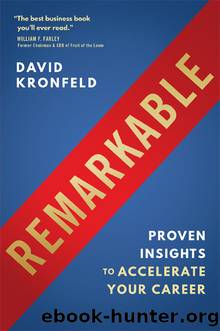Remarkable by David Kronfeld

Author:David Kronfeld [Kronfeld, David]
Language: eng
Format: epub
Tags: Business & Economics, Personal Success, Careers, General, Self-Help, Personal Growth, Success
ISBN: 9781953295972
Google: u_0xEAAAQBAJ
Publisher: BenBella Books
Published: 2021-09-07T23:20:07.109953+00:00
Starting a âWarâ Instead of Winning a âBattleâ
A scientist invented a new technology around which he wanted to build a company. He approached various venture capital firms to raise the necessary money to launch a start-up. We listened to his pitch and liked what we heard. We told him that we would be interested in potentially proceeding with him.
From our experience, one of the greatest impediments for striking a deal with such scientists/founders is their exaggerated perception of the value of their newly founded company. In the venture capital world, this value is referred to as the âpre-money valuationâ of the company. It is an important concept since it determines how much ownership the venture capitalist (VC) receives for its investment in a company. Conversely, it also determines how much ownership the founder will retain.
To determine the amount of ownership, the venture capitalist assigns a monetary value to what the founder created before the contemplated transaction, which is the âpre-money valuation.â The pre-money refers to the value before our money goes in as an investment. Once that value is determined, the percent ownership is determined by a mathematical formula.
For example, letâs assume that the VC assigns a value of $10 million to the company (that is, a $10 million pre-money valuation). Letâs further assume that the VC will invest $5 million in cash. Thus, the total value of the enterprise after the $5 million infusion of cash from the VC is $15 million (i.e., the $10 million cash equivalent the founder brings to the party, plus the $5 million the VC brings to the party). The $15 million is referred to as âpost-money valuationâ (that is, the company is worth a combined cash and cash-equivalent value of $15 million). The VC contributes $5 million of the $15 million, or $5/$15 = 33.33 percent of the value. The founder brings $10 million of value, or $10/$15 = 66.66 percent of the value. These proportions thus represent the percent ownership of the company after the consummation of the deal. Clearly, every founder will try to negotiate the highest pre-money valuation for their company, since the higher the pre-money valuation, the higher will be their percent ownership.
As I mentioned, most founders have an exaggerated estimate of what their company is worth. They think their company will be worth billions of dollars in the future, ergo it must be worth hundreds of millions today. VCs look at it differently. Although the estimated potential may be realistically great, most companies never get there. âExitsâ occur much earlier and at much lower valuations, reflecting real performance, not some exaggerated potential beliefs. VCs place a more realistic expectation on performance and potential exit values. The pre-money valuation the VC would be willing to offer is mathematically driven from that exit value.
Letâs assume the VC places a $300 million exit valuation. The VC will then estimate how much money they will need to invest to make it happen. They require a certain multiple return for their investment. Thus, they know exactly how much of the company they need to own to get that multiple return.
Download
This site does not store any files on its server. We only index and link to content provided by other sites. Please contact the content providers to delete copyright contents if any and email us, we'll remove relevant links or contents immediately.
Zero to IPO: Over $1 Trillion of Actionable Advice from the World's Most Successful Entrepreneurs by Frederic Kerrest(4568)
Machine Learning at Scale with H2O by Gregory Keys | David Whiting(4313)
Never by Ken Follett(3955)
Harry Potter and the Goblet Of Fire by J.K. Rowling(3856)
Ogilvy on Advertising by David Ogilvy(3622)
Shadow of Night by Deborah Harkness(3367)
The Man Who Died Twice by Richard Osman(3077)
Book of Life by Deborah Harkness(2938)
The Tipping Point by Malcolm Gladwell(2921)
Will by Will Smith(2919)
Purple Hibiscus by Chimamanda Ngozi Adichie(2853)
0041152001443424520 .pdf by Unknown(2845)
My Brilliant Friend by Elena Ferrante(2831)
How Proust Can Change Your Life by Alain De Botton(2814)
How to Pay Zero Taxes, 2018 by Jeff A. Schnepper(2655)
Hooked: A Dark, Contemporary Romance (Never After Series) by Emily McIntire(2553)
Rationality by Steven Pinker(2363)
Can't Hurt Me: Master Your Mind and Defy the Odds - Clean Edition by David Goggins(2339)
Borders by unknow(2313)
